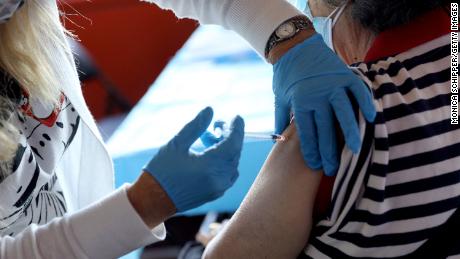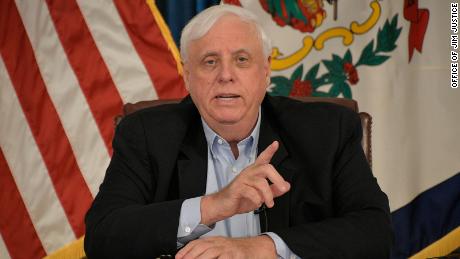The FDA and CDC issued an unusual rebuke against the pharmaceutical giant hours after it warned of waning immunity from its coronavirus vaccine
The CDC’s new guidance comes when many parents are still anxious about the risks of Covid-19 variants, as well as the many unknowns about what the long-term effects of Covid infections could be in children.
“We need clarification on the percentage of children who have debilitating effects from Covid, especially neurological effects in the developing brain,” Hotez told CNN’s Pamela Brown. “We need the pediatric neurological societies to really look into this more in depth. … We tend to use very blunt instruments when talking about either adolescents’ or children’s deaths, and only hospitalizations. There are so many more dimensions to Covid than that.”
New confusion about booster shots
Back in April, Pfizer CEO Albert Bourla suggested that “there will be likely a need for a third dose, somewhere between six and 12 months” after the first round. On Thursday, the company confirmed his prediction in a formal statement, citing a recent statement from Israel’s Ministry of Health that said the efficacy of the Pfizer vaccine declined after six months, along with unreleased data from the company’s ongoing studies.
Pfizer offered an important caveat that was mostly lost in the shock of its announcement, confirming that the vaccine’s protection against “severe disease remained high across the full six months.” The drop in efficacy manifested as a rise in symptomatic illness, the company said, while also pointing to the emergence of dangerous new variants as reason to get a jump on authorization for a booster.
But the hazy reasoning behind Pfizer’s declaration, which was delivered without clear clinical evidence of its underlying assertion, was met with the sharp contradictory statement from the leading US regulatory agencies.
The message from the government agencies was clear: The decision was not Pfizer’s to make.
“This process takes into account laboratory data, clinical trial data, and cohort data — which can include data from specific pharmaceutical companies, but does not rely on those data exclusively,” they said in the statement.
In an interview with CNN’s Wolf Blitzer on Friday night, Dr. Anthony Fauci, the nation’s leading infectious diseases specialist, disputed the idea that Americans were receiving a “mixed message” and said it is important for them to trust that their government agencies will tell them when and whether they might need a booster shot.
“We respect what the pharmaceutical company is doing, but the American public should take their advice from the CDC and the FDA,” said Fauci, the director of the National Institute of Allergy and Infectious Diseases. “The important bottom line in all of this is that the efficacy (of the vaccine) against severe disease — particularly hospitalization that might lead to death in some individuals — was still really very good.”
White House press secretary Jen Psaki stressed Friday afternoon that the decision about when a booster might be needed is “going to be led by the data and by the science.”
“We wanted to make clear that that is not something that the American people need to plan for at this moment,” Psaki said.
As concerning as Pfizer’s claim might have been to some, the public clash between the pharmaceutical giant and top US government agencies could foreshadow something worse.
Public and private institutions have largely spoken with one voice as the vaccines were developed and distributed, a useful tool for public health leaders working to chip away at hesitance as they pushed forward with this unprecedented mass vaccination campaign.
But signals of a divide between the two could deal a devastating setback to that project, offering fodder to anti-vaccination agitators.
Asked at the briefing whether the administration would push for coordination on these kinds of announcements — as a way of preventing another similar back-and-forth — Psaki appeared to betray some frustration with Pfizer’s actions.
“They are a private-sector company. I can’t speak to the origin or the motivation of their announcement. You’d have to ask them that,” Psaki said. “But the role we can play, from the US government, is to provide accurate information and public health information, which is what we’ve ventured to do last night pretty rapidly in response to the announcement.”
Huge challenge in regional divide over vaccines
The CDC guidance on schools is likely to become part of that debate, just as it was last year when President Donald Trump was in office.
The CDC stressed Friday that schools should continue using safety precautions, including masking and physical distancing, while encouraging those who are eligible to get vaccinated, such as offering vaccines on site and providing paid sick leave for employees to get vaccinated.
Fully vaccinated teachers and students do not need to wear masks, the guidance said, but the CDC still wants to see unvaccinated children masked indoors and for schools to continue physical distancing if not everyone is vaccinated.
Schools that want to begin phasing out pandemic precautions should do so carefully, the CDC said, by removing them one at a time — if community transmission levels are low — while continuing a robust testing regimen to monitor for increases in spread before removing the next safety measure.
Dr. Megan Ranney, an emergency physician at Rhode Island Hospital and an associate professor at Brown University, noted that she has been a proponent of schools being open even before vaccines were on the scene. But now she is concerned that “the states that have low vaccination rates are also the states that are less likely to put the non-pharmaceutical interventions in place.”
“They’re going to be less likely to say that kids should mask in school,” Ranney said Friday on CNN’s “Inside Politics.” “So they’re going to be setting up their communities, not just for the spread of the virus within the kids, but also within the larger community. Because those kids are then going to spread Covid on to their parents and grandparents and extracurricular school instructors. That’s what worries me even more than whether we can open the schools or not.”
![]()






